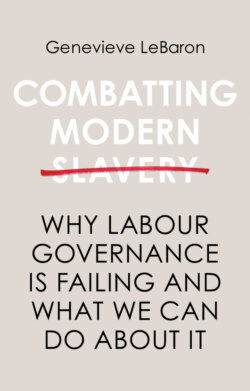Читать книгу Combatting Modern Slavery - Genevieve LeBaron - Страница 17
The enforcement industry
ОглавлениеAnother set of industry actors that pose a crucial challenge to efforts to upgrade and improve working conditions worldwide is the enforcement industry. As mentioned, as part of the broader shift towards the privatization of supply chain governance, industry actors and NGOs have taken on roles as ‘monitors’ and ‘enforcers’ of labour standards in supply chains. But while private supply chain monitoring tools and programmes are highly profitable for accounting firms, NGOs and other industry actors involved in selling them, these seldom lead to concrete improvements for workers. Retail and brand companies leverage highly strategic control over the design and implementation of auditing programmes, including over new ‘beyond audit’ initiatives. As such, the ability of these programmes to detect and report exploitation and spur corrective action is limited. In the words of one UK audit firm employee, the majority of supply chain monitoring programmes ‘are not trying to find things out, they’re trying to prove that something is not there’.62
As I will argue in Chapter 5, the enforcement industry is helping to conceal rather than solve the most urgent labour issues in supply chains. Taken as a whole, it is misrepresenting the nature of labour conditions and practices, not only doing little to help workers, but actively misleading consumers and policymakers about their plight. The enforcement industry is helping corporations to legitimize and grow their businesses, in part by generating media- and consumer-friendly metrics and reports that are helping to stave off pressure from civil society groups and reassure investors. But it is doing little to solve the urgent problem of labour exploitation in supply chains.
